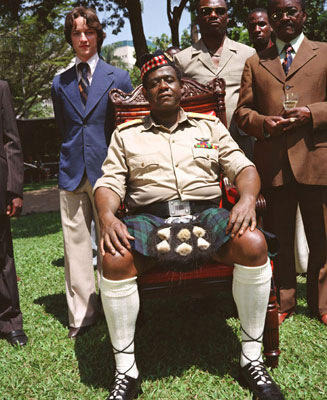
 Loosely
based on the critically-acclaimed novel by Giles Foden, The Last King of
Scotland pits fictional protagonist Nicholas Garrigan (McAvoy,
The Chronicles of Narnia), a young Scottish doctor
looking to help the sick and needy in Uganda, amid the real-life political
situation that takes place there in the early 1970s. Through a series of
circumstances, Garrigan ends up becoming the personal physician and most trusted
adviser of the new president of the country, Idi Amin (Whitaker,
Phone Booth), with whom he strikes up an
unsteady friendship.
Loosely
based on the critically-acclaimed novel by Giles Foden, The Last King of
Scotland pits fictional protagonist Nicholas Garrigan (McAvoy,
The Chronicles of Narnia), a young Scottish doctor
looking to help the sick and needy in Uganda, amid the real-life political
situation that takes place there in the early 1970s. Through a series of
circumstances, Garrigan ends up becoming the personal physician and most trusted
adviser of the new president of the country, Idi Amin (Whitaker,
Phone Booth), with whom he strikes up an
unsteady friendship.
Garrigan thinks Amin is a noble man,
although he soon finds out that he's been sheltered from knowing the truth about
the dictator's tactics, as prominent people end up missing without a trace and
rumors fly around the thousands of deaths that have been occurring at the hands
of this man who claimed to be of the people. Garrigan wants to get out,
but now he's in too deep, and as Amin's enemies continue to grow in number, the
more paranoid, dangerous, and mentally unstable he becomes.
As directed by documentarian Kevin
Macdonald (Touching the Void, One Day in September), the film version
differs from the book in making the relationship between Garrigan and Amin more
intimate, and eventually much more deadly. Although this decision might
make the film more accessible to a wider audience, as it is easier to understand
what Amin does when it seems to be a direct result of information that cuts to
his very core, it does weaken the larger political story overall by making the
focus more about crimes of passion than it is about crimes against humanity.
It also makes Garrigan seem like the biggest dimwit on the face of the planet,
who actively seeks to have sexual liaisons with whomever he desires, regardless
of whether these women are married and to whom.
Gillian Anderson's (Playing
by Heart, Chicago Cab) character of Sarah
Merrit, the wife of a good man and doctor, rebuffs his advances, and yet he
persists, only thinking about his momentary pleasures. The same eventually
occurs with one of Amin's wives, Kay (Washington,
Little Man), who Garrigan idiotically must have, even after knowing about Amin's incredible paranoia and acts of brutality toward anyone he finds disfavor
with. From a story standpoint, you know where it's all headed, and as a
testament of Amin's cruelty, it is convincing, but at the same time, it's
difficult to shake the feeling that Garrigan has given Amin little option in the
matter, as the dictator's main modus operandi in his killings is predicated on the notion of making examples of those who seek to do him harm,
personally and politically, which Garrison is shown to do repeatedly throughout.
Although the thematic thrust is weakened by
this portrayal of Garrigan's lack of self-control and his indirect involvement
in the deaths of at least three people in the film who have only operated out of
kindness and compassion, the film is still very successful as a character study
of a dangerous man on the brink of his own madness. Forest Whitaker gives
perhaps his finest performance as the enigmatic world figure, giving him a
certain sense of sympathy in his earnestness by which he seeks to reform his
country, only to completely lose all sight of his plans when he cannot seem to
stamp out the feelings of discontent and loyalty among his own people, not only
in the public, but also in his own inner circle. Although Garrigan is the main
player, it is only in his interactions with Amin, directly and indirectly, that
he
provides the fundamental interest in his story.
The Last King of Scotland is an
effective thriller, harrowing when it needs to be, and as a character study, it
does shed light on a historical figure known mostly as a villain in the world
scene. Many elements of the relationship between Amin, his family and the
people around him are fascinating, and with some very good performances by
Whitaker and Washington, the film commands your attention throughout.
While I do think, from a story standpoint, it's a shame that Garrigan wasn't
limited to being a mere witness to the events of the Amin era, as he was
portrayed more in the book, instead
of a constant catalyst for Amin's rage, considering he is a fictional character,
we'll just chalk up his constant missteps as dramatic license taken by the
screenwriters in drawing out Amin to commit some of the most heinous acts of
torture shown in film this side of a Mel Gibson directorial effort. It's a
riveting portrait of tragic insanity, not only for one person, but for an entire
nation so consistently ravaged by his remorselessly brutal power.
Qwipster's rating:





©2007 Vince Leo

